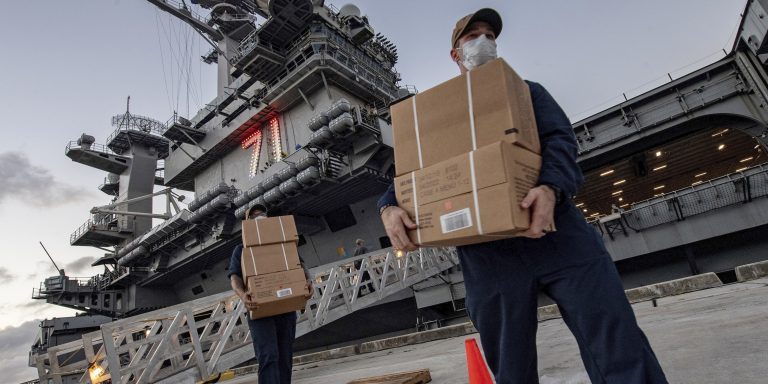INTELBRIEF
April 23, 2020
IntelBrief: How Will COVID-19 Impact U.S. Military Readiness?

- COVID-19 has required the U.S. military to shift personnel and materiel to a domestic mandate to augment civilian state and federal agencies’ capabilities, leaving U.S. entities overseas more vulnerable than ever.
- NATO’s cancellation of Defender Europe-20 comes at a time of great uncertainty in Europe as Russian Federation adventurism looms over the Baltic states.
- Other canceled U.S.-led military exercises could erode partner countries’ capacity to respond to challenges in Iraq as well as in North and West Africa where a patchwork of Salafi-jihadist groups threaten stability.
- COVID-19’s impact on military education could have enduring negative consequences for U.S. military preparedness, especially if quarantine rules are extended for a prolonged period.
COVID-19’s impact on military readiness and force projection may have significant short-term and mid-term consequences. The U.S. military is playing a significant role in providing triage support to state and federal government civilian agency capacities due to their own lack of capacity. The National Guard and the U.S. Army Corps of Engineers have deployed several assets, including medical equipment, field hospitals, multiple hospital ships, and personnel to deal with the domestic carnage that COVID-19 has left in its wake. The deployment of personnel and equipment potentially exposes U.S. assets to harm and could thus limit their ability to be used in transnational contingencies.
COVID-19’s impact also extends to the world’s premier intergovernmental alliance, the North Atlantic Treaty Organization (NATO). One clear consequence of COVID-19 was the cancellation of the NATO Defender Europe-20 military exercise, which was to be led by U.S. Army Europe. Defender-Europe 20 was to involve the deployment of more than 20,000 U.S. troops and 20,000 pieces of materiel, with the bulk of the multinational drills aiming to illustrate U.S. and NATO interoperability and its capability to extend the reach of multiple divisions into Eastern Europe. The cancellation of the exercise comes at a time of growing apprehension over Russian adventurism in Crimea, Eastern Ukraine, and Europe, which continues to reverberate throughout Western capitals, from Washington to Brussels.
COVID-19 is also sure to impact another key Trump administration objective – NATO playing a larger role in countering the so-called Islamic State (IS) as the United States continues to draw back resources from its counterterrorism mission. In late February, NATO announced an increase in resources for its training mission in Iraq, but it remains unclear where such resources will come from. Also, how quickly those plans will be realized are in significant doubt. The impact could be critical as IS continues to reconstitute itself in wake of the power vacuum resulting from a diminished U.S. footprint in the region. Finally, the U.S. military has cancelled numerous other joint exercises. In Africa, where a mosaic of resurgent Salafi-jihadist groups continues to expand operations, the U.S. Africa Command (AFRICOM) canceled Exercise African Lion 2020, which was to be conducted in Morocco, Tunisia, and Senegal. The AFRICOM maritime exercise, the Phoenix, slated for April, was also cancelled. In the Arctic tundra, Operation Cold Response, involving ten countries, including the United States, was cancelled after it began because a Norwegian soldier tested positive for coronavirus. COVID-19’s disruption of U.S. and NATO military exercises attenuates readiness while providing an opening to state and non-state actors to exploit.
U.S. military education has also been negatively impacted by COVID-19. The U.S. Military (Army) and Naval academies quickly pivoted to remote learning. The decision to transition to online learning took hold more slowly at the Air Force Academy, where 1,000 cadets, all seniors, were told to remain on campus. While on campus and in social isolation, two Air Force cadets tragically committed suicide in late March. The U.S. military academies are critical to the replenishment of the officer corps in every branch of the military. While graduating seniors can effectively assume the roles they have been groomed to fill within their chosen service, the long-term impact on the academies' younger generation will be more difficult to gauge, especially because hands-on learning, or tacit knowledge, is indispensable to their future success as officers. If prolonged indefinitely, online learning could lead to a diminishment of key skills and capabilities required of commissioned officers who are expected to lead soldiers into battle. Finally, the influx of new military recruits has been halted as services like the Army have delayed onboarding due to the COVID-19 pandemic. Similarly, the U.S. Marine Corps cancelled the arrival of new trainees to its recruitment depot at Parris Island, South Carolina. COVID-19’s impact on training future officer and non-officer personnel is already impairing military readiness.
.
For tailored research and analysis, please contact: info@thesoufancenter.org